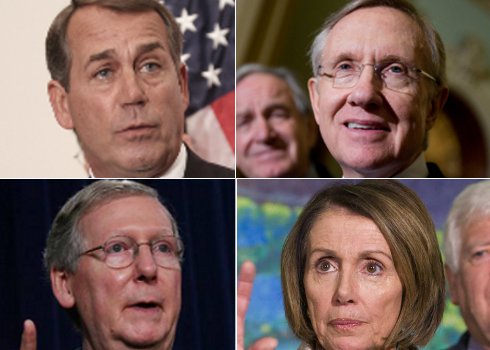We now know who’s serving on the 12-member deficit Super Committee this fall. We know who the two co-chairs will be, we know many if not all of the requirements it must meet, and we know what happens if it fails.
Which means we know the battle lines and can project with some certainty how the fight will play out.
Of the six Democrats on the committee, most if not all have publicly proclaimed they’ll support certain cuts to Medicare and Medicaid — particularly if they fall hardest on providers and not beneficiaries — but only if Republicans are willing to accept some “meaningful” new tax revenues.
Of course, all of the six Republicans have pledged never to support tax increases, and most if not all have demonstrated extreme reluctance over raising any revenues at all, including from loophole closures that benefit extremely few privileged individuals and businesses.
Those are the principles that will govern the dynamic on the panel. Dems: no entitlement cuts without some revenue hikes. Republicans: no revenue hikes. If Republicans are willing to deal, then there’ll be plenty of room for one or two Democrats to join the GOP in a slanted plan that meets the committee’s charge.
The committee must report a package that would reduce the deficit by at least $1.2 trillion by November 23. If it misses that mark or fails to produce a plan at all, it triggers an across the board spending cut penalty — to Medicare providers, as well as to domestic and defense programs — totaling up to $1.2 trillion beginning in 2013. If it recommends less than $1.2 trillion in deficit reduction, the difference will come, proportionately, from the same penalty.
And that penalty is key. If Republicans don’t deal on taxes, they’ll fall under increasing pressure from defense and health care interests to cave. That will drive a wedge through the Republican party, cleaving the war hawks from the anti-tax zealots, the first time in the recent past they’ve been forced to reckon with their incompatible big spending and no new taxes orthodoxies. But Democrats will be under pressure to cave as well, possibly even from President Obama and Defense Secretary Leon Panetta, who say the defense budget can’t withstand $500 billion in further cuts.
If Democrats do cave, then they’ll have allowed Republicans to run roughshod over them, despite controlling both the Senate and the White House. They’ll have ransomed the hostage without capturing any of the captors, agreed to cut spending, including entitlements, by over $2 trillion without forcing the GOP to give an inch on revenue, and set themselves up to lose a generational fight with the right over the proper role of government.
“We have a spending problem, not a revenue problem.” That’s a Republican talking point. More importantly, it’s code for the underlying truth that conservatives don’t like entitlement programs, and would rather bleed them slowly than ask wealthy people to pay more in taxes. More tax revenues might buy the time needed to rein in health care costs — the main driver of long-term deficits — and make the government’s entitlement commitments solvent. But that would defeat the underlying goal. Unfortunately for them, the goal is not politically popular, and for months they’ve been trying to trap Democrats into giving them the cover they need to accomplish it — or at least make strides toward accomplishing it. So far they’ve been unsuccessful but they can do it two ways on the Super Committee, both of which involve refusing to raise taxes. They can push Democrats to cave on their demand for balance, on the threat that the enforcement mechanism will kick in if they don’t relent. Or they can allow the enforcement mechanism to kick in, which would cut Medicare provider payments by two-percent across the board automatically. Each scenario will touch off a public political fight. One argument will go: “Democrats want rather raise taxes so badly, they’ll allow deep cuts to military pay.” The other will be: “Republicans are so committed to protecting the wealthy from paying a penny more in taxes that they’ll allow deep cuts to defense and Medicare.”
Or, the Republicans relent on taxes. But so far they’ve shown no willingness to do that. So it looks like this is where we’re headed.
Get the day’s best political analysis, news and reporting from the TPM team delivered to your inbox every day with DayBreaker. Sign up here, it takes just a few seconds.
Correction: This article initially described the Super Committee’s enforcement mechanism inaccurately. We regret the error.










